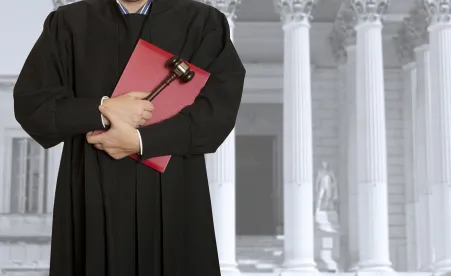A number of community associations are governed by Declarations/Master Deeds and By Laws containing a provision that any controversy or claim arising out of, or relating to the Declaration/Master Deed or By Laws, must be submitted to and decided by the American Arbitration Association (AAA) under its Commercial Arbitration Rules. This provision is intended to provide a cost and time efficient alternative to litigation. In theory, the use of the AAA for resolution results in a faster and less costly alternative to litigating such controversies and claims. In fact, depending on the nature and size of the matter, advantages of utilizing the AAA do exist.
To easily understand the streamlined process utilized by the AAA for resolution of relatively straightforward, typically collection related disputes, a brief outline of the necessary steps involved is helpful.
-
AAA arbitration is initiated by the filing by the Claimant of a Demand for Arbitration. The Demand, the administrative filing fee, and the provision providing the authority for arbitration before the AAA must accompany the Demand for the filing to be deemed complete. The Demand for Arbitration under the Commercial Arbitration Rules is a simple two- page form wherein the parties are identified, a description of the dispute is provided, and the amount of the claim is stated.
-
The Respondent may file an Answering Statement, typically within 14 days after notice of the filing of a Demand has been sent by the AAA. If no Answering Statement is filed, the claim will be deemed as having been denied. The Respondent may also file a Counterclaim. The Counterclaim must include a statement setting forth the nature of the counterclaim including the relief sought and the amount involved.
-
Following the filing of the Demand and Answering Statement or Counterclaim if any, the Arbitrator will typically schedule a Preliminary Hearing Conference Call. That call will result in a Scheduling Order and will address the dates for submissions by the Claimant, Responses and Replies. It will also schedule an additional status conference, if needed, as well as the timing of Motions, Discovery, Exhibits and a determination as to whether the Final Hearing will be documents only, in person, or by telephone or videoconference. It will also address the timing of the ultimate Award.
Regarding collection cases, if the matter in controversy is less than $25,000, the matter may be heard on the documents submitted, without any in person or telephonic hearing. For matters more than $25,000, such cases can also be heard on documents only if the parties agree. Of course, this is typically the fastest and least costly way to submit matters to the AAA.
When submitting a collection claim to the AAA, the Claimant’s Brief should include the Governing Document sections addressing the payment of maintenance fees, the authority pursuant to NJSA 46:8B-1 et seq. as well as the authority pursuant to the Declaration/Master Deed and By Laws of the association to pursue owners in the event of non-payment, including interest, attorney’s fees and costs, as well as the authority to proceed by way of AAA arbitration. Certifications of Proof must include the amounts due and owing per the ledger, including legal fees and costs, any offsets and credits, and the total amount sought in the arbitration award. A Certification of Attorney’s Fees should also be included.
When the authority of the association is clear, and the ledger and Certification of Fees are also detailed and clear, the Arbitrator should be able to decide the matter on the documents submitted. Frequently, the Arbitrator will decide the case and issue a Decision within 14 days of the “Hearing”. Ordinarily, the rendering of a Decision will conclude the matter and result in ultimate payment. When payment is not made, however, the Claimant must then proceed by way of suit to confirm the Award and have Judgment entered so that collection efforts can be commenced. In such cases, the advantages of AAA arbitration diminish due to the need to incur additional legal fees.
If it becomes necessary to file suit to confirm the arbitration Award and seek the entry of Judgment, such action should be commenced by Verified Complaint and Order to Show Cause. The suit is a summary action pursuant to NJ Court Rule 4:67-1 et seq and NJSA 2A:23B-22, the NJ Uniform Arbitration Act. Under the Act, upon the filing of a summary action with the Court by a party to an arbitration proceeding, the Court “shall” confirm the arbitration Award pursuant to NJSA 2A:23B-22 unless there are grounds to vacate the award under NJSA 2A:23B-23. The grounds typically alleged when seeking to vacate an arbitration Award, are that the Award was procured by corruption, fraud or other undue means; the court finds evident partiality by the arbitrator, corruption by the arbitrator; misconduct by the arbitrator prejudicing the rights of a party, or the arbitrator refused to postpone the hearing upon showing of sufficient cause for postponement, refused to consider evidence material to the controversy, or otherwise conducted the hearing contrary to section 15 of the Act, so as to substantially prejudice the rights of a party to the arbitration proceeding; or the arbitrator exceeded his or her authority.
Unfortunately, if it becomes necessary to proceed by way of OTSC to confirm the Award and seek entry of Judgment, the benefits of proceeding by way of arbitration decrease because the time and costs incurred by the association increase. However, with the possibility that the legal fees incurred by the association in having to bring the confirmation proceeding, might be imposed on the defendant, many times the defendant rethinks his or her position, and the Award by the arbitrator constitutes the end of the controversy and the last of the fees incurred by the association. In such cases, the arbitration process might prove to have been a good alternative to traditional litigation. However, if the fees borne by the association in seeking confirmation of the Award and entry of Judgment are not imposed on the defendant, the benefits will be greatly diminished.
As a result, while benefits of AAA arbitration are certainly possible, whether they are realized, will differ case by case and will only be known at the conclusion of the matter.



 />i
/>i

